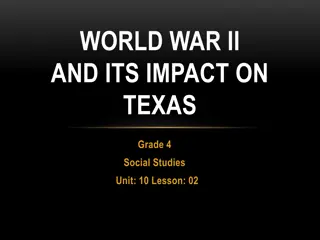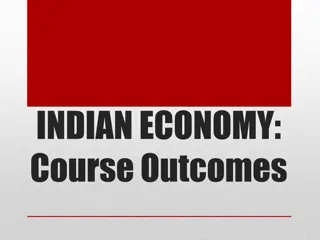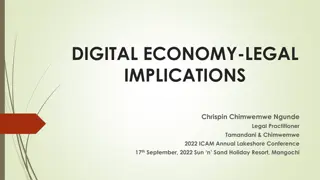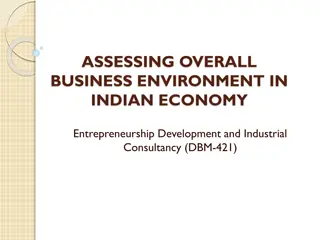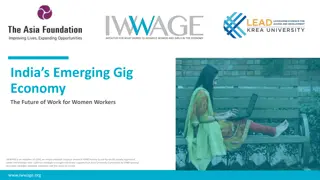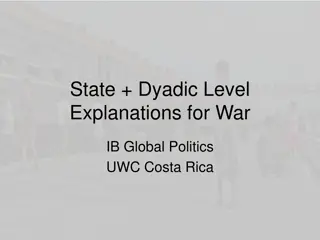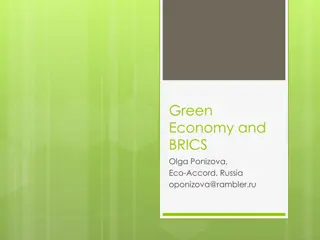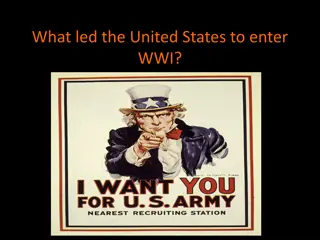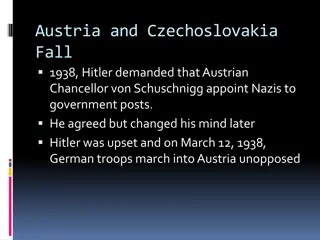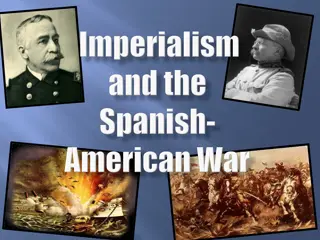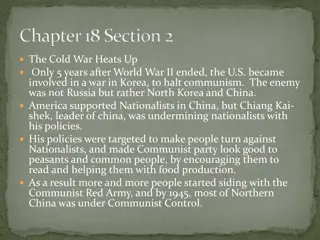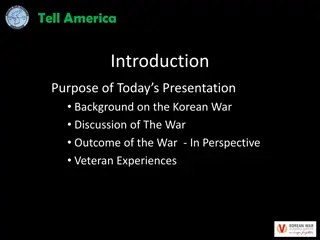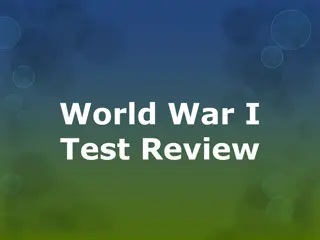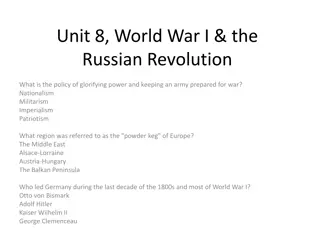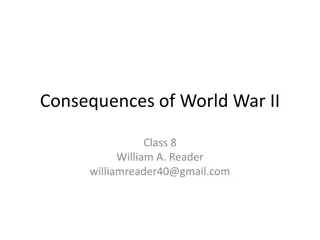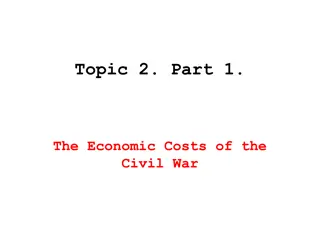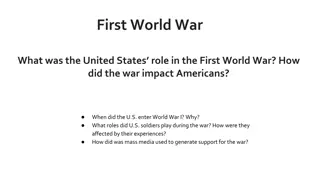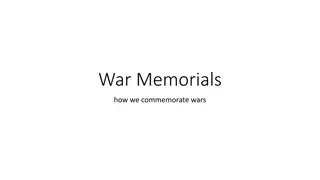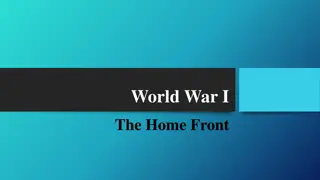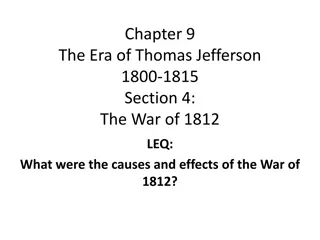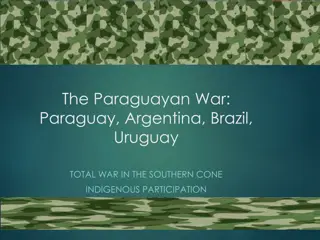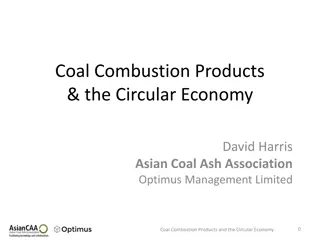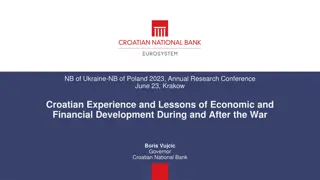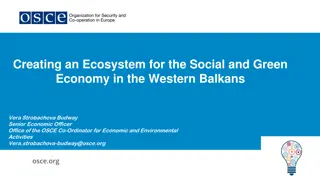❤[PDF]⚡ Civil War Talks: Further Reminiscences of George S. Bernard and His Fel
\"COPY LINK HERE ; https:\/\/getpdf.readbooks.link\/0813931754\n\nRead ebook [PDF] Civil War Talks: Further Reminiscences of George S. Bernard and His Fellow Veterans (A Nation Divided: Studies in the Civil War Era) | Civil War Talks: Further Reminiscences of George S. Bernard and His Fellow Vetera
1 views • 6 slides
Glossary of Key Terms
Explore essential terms in economics such as command economy, consumer, demand, economic system, free enterprise system, goods, innovation, market economy, marketplace, mixed economy, needs, producer, profit, resources, scarcity, services, supply, technology, trade-off, traditional economy, and want
3 views • 6 slides
Texas during World War II: Impact and Involvement
World War II had a significant impact on Texas, with 750,000 Texans serving in the military and 22,000 losing their lives. The state became crucial for military training, hosting 1.5 million soldiers in various installations. Before the war, Texas had a predominantly rural population with limited ac
0 views • 23 slides
Leveraging Non-Oil Exports for Nigeria's Blue Economy Growth
Nigeria Export Promotion Council (NEPC) focuses on diversifying Nigeria's economy by promoting non-oil exports for sustainable growth. The Blue Economy concept involves sustainable use of ocean resources for economic development. Nigeria's abundant ocean resources such as maritime transportation, fi
0 views • 20 slides
The Homefront: U.S. War Production Efforts During World War II
During World War II, the United States mobilized its industries for total war production, converting peacetime factories into facilities for producing planes, tanks, rifles, and more. The U.S. became the Allies' biggest armaments supplier, producing millions of war supplies and significantly boostin
2 views • 25 slides
Understanding Indian Economy: Course Outcomes and Resources
Explore the course outcomes of the Indian Economy, covering economic development, policies, population growth, planning, agriculture, Kerala's economy, and resources for further study. Access government data and publications on the Indian economy for comprehensive learning.
0 views • 9 slides
Legal Implications of the Digital Economy in Malawi
Explore the legal implications of the digital economy in Malawi as discussed at the ICAM Annual Lakeshore Conference. Topics include the Electronic Transactions and Cyber Security Act, principles of implementation, Malawi CERT, data privacy, and the significance of the digital economy in transformin
0 views • 44 slides
Overview of Modern Business Environment in Indian Economy
Modern business in the Indian economy is characterized by large size, oligopolistic nature, diversification, global presence, technology orientation, and changing government regulations. The Indian economy features a mixed economy with both private and public enterprises, low per capita income, uneq
0 views • 14 slides
Insights into India's Thriving Gig Economy and Future Work Trends
India's gig economy, spearheaded by initiatives like IWWAGE, is reshaping the future of work, particularly for women. Key questions revolve around the gig economy's impact, legislative frameworks, and COVID-19 repercussions. Academia investigates the rise of gig work, focusing on platforms like Uber
0 views • 11 slides
The Blue Economy and Marine Pollution: A Comprehensive Overview
The presentation outlines the thriving ocean economy, the concept of the Blue Economy, the World Bank's approach, risks faced by oceans, and the impact of marine pollution on Small Island Developing States and coastal regions. It emphasizes sustainable development of oceanic activities, collaboratio
1 views • 12 slides
Examining State-Level and Dyadic Explanations for War in Global Politics
Understanding the reasons why certain states are more war-prone than others involves exploring factors such as economy, internal opposition, and political systems. Marxist explanations argue that capitalist economies are more prone to war due to issues like overproduction, wealth inequality, and imp
0 views • 17 slides
Origins of the Cold War: Yalta and Potsdam Conferences 1945
The Cold War's origins stem from the tensions and suspicions between the USSR and the West post-World War II, highlighted through conferences like Yalta and Potsdam. At the Yalta Conference, held in February 1945, crucial decisions were made regarding Germany, Poland, and the UN. The Potsdam Confere
0 views • 10 slides
Insights into World War Two and Adolf Hitler's Role
World War Two started on September 3, 1939, with Britain and France declaring war on Germany. Adolf Hitler's rise to power, initiation of the war, and involvement in the Holocaust are highlighted. The Star of David symbolized Jewish identity under Hitler's rule, and the Holocaust saw six million Eur
0 views • 6 slides
Insights into Social Economy and Social Dialogue Research Outcomes
Research outcomes from the Mesmer+ project at HIVA KU Leuven reveal misalignments in social dialogue inclusiveness, challenges faced by social economy entities, and the role of employers in the social economy. Recommendations include enhancing the role of social economy employers and promoting inclu
1 views • 7 slides
Exploring the Green Economy and BRICS Cooperation
The discussion focuses on the importance of the green economy for BRICS nations, suggesting ways for collaboration, especially in addressing climate change and transitioning to a low-carbon economy. The BRICS countries play a crucial role in global stability and sustainable development. Features of
0 views • 22 slides
Analysis of W.B. Yeats' Poetry During World War I
W.B. Yeats' poetry during World War I reflects a unique perspective on the conflict, as seen in works like "An Irish Airman Foresees His Death" and "On Being Asked for a War Poem." Delving into themes of sacrifice, duty, and the futility of war, Yeats offers a contrasting view to the graphic realism
0 views • 7 slides
The Impact of Pandemics on the Shadow Economy Performance
Pandemics have a significant impact on the shadow economy, influencing the legal economy in various ways. The shadow economy serves as a buffer for high unemployment rates and can contribute to budget revenues through legal spending. Studies suggest that a growing shadow economy may reflect dissatis
0 views • 12 slides
Why the United States Entered World War I
The United States initially remained neutral during World War I, but various factors led to its eventual entry into the conflict. Growing anti-German sentiments, impact of the war on the American economy, incidents like the sinking of the Lusitania, and the revelation of the Zimmerman Telegram all p
0 views • 18 slides
Timeline of Key Events Leading to World War II
In the years leading up to World War II, a series of significant events unfolded in Europe. From Hitler's demands and annexations to the signing of pacts and the invasion of Poland, tensions escalated rapidly. The Munich Agreement, German offensive in Poland, declaration of war by France and Britain
0 views • 12 slides
Evolution of Services Marketing in the Modern Economy
The shift towards a service economy has transformed marketing practices, leading to the emergence of Services Marketing as a distinct discipline. This evolution highlights the unique characteristics of services, such as intangibility and simultaneous production-consumption. The 1980s mark a pivotal
0 views • 13 slides
The Impact of the Korean War on Global Relations
The Korean War, often dubbed the "Forgotten War," had significant implications on global politics and relationships. This conflict was characterized by a mix of conventional and guerilla warfare tactics. China's involvement in the war had a profound impact on its relations with the U.S. and the U.S.
0 views • 14 slides
The Spanish-American War: Origins and Impact
The Spanish-American War was fueled by a combination of factors including economic struggles, imperial ambitions, and sensationalist journalism. Theodore Roosevelt's stance on war, coupled with the desire for Cuba's independence from Spain, led to a call for war in the late 1890s. Yellow journalism
0 views • 18 slides
The Cold War Heats Up: Korea and China Conflict
The post-World War II era saw the U.S. engaging in the Korean War to combat communism, facing off against North Korea and China instead of Russia. Conflict in China between the Nationalists led by Chiang Kai-shek and the Communists under Mao Tse-tung intensified, with Chiang's authoritarian rule spa
0 views • 14 slides
Causes and Outbreak of World War I
Various factors such as nationalism, imperialism, militarism, and the assassination of Archduke Francis Ferdinand led to the outbreak of World War I. The tensions in Europe escalated as countries formed alliances and mobilized for war. The conflict resulted in early battles like the Battle of Marne
0 views • 23 slides
Overview of the Korean War: Background, Discussion, and Outcome
This presentation delves into the background of the Korean War, highlighting the historical context from the Korean Peninsula's division after World War II to the outbreak of the conflict in 1950. It discusses the involvement of North and South Korea, as well as key players like the United States, t
0 views • 15 slides
World War I Test Review and Historical Overview
Learn about the key terms and concepts related to World War I, including militarism, nationalism, neutrality, propaganda, espionage, and more. Explore the long-term causes of the war, the immediate trigger, the Central Powers and Allied Powers involved, as well as important events like the Zimmerman
0 views • 13 slides
World War I and the Treaty of Versailles: Key Events and Consequences
The policy of glorifying power and militarism, the tensions in the Balkan Peninsula, Germany's leadership, causes of the United States' entry into World War I, impact of unrestricted submarine warfare, transition to total war, the end of the war with an armistice, the Treaty of Versailles assigning
0 views • 10 slides
The Impact of World War II on Japan and the Emergence of the Cold War
World War II had far-reaching consequences on Japan, leading to significant naval battles, intense fighting in Okinawa, and ultimately, the country's surrender following the atomic bombings of Hiroshima and Nagasaki. The post-war period saw the emergence of the Cold War as tensions rose between the
0 views • 63 slides
Understanding the Impact of the Gig Economy on Marginalized Groups in Toronto
This report delves into the effects of the gig economy on racialized and immigrant populations in Toronto. It outlines research findings, stakeholder insights, and strategic recommendations to address the challenges faced by marginalized groups in the gig economy. The study aims to shed light on the
0 views • 25 slides
The Economic Costs of the Civil War and Its Impact on Growth
The Civil War led to significant economic costs for both the North and the South, including direct expenses such as government spending, destruction of physical and human capital, and indirect costs due to reduced consumption. The war resulted in massive casualties and had a profound impact on the e
0 views • 34 slides
The Learning Consortium for the Creative Economy Webinar Summary
The webinar on The Learning Consortium for the Creative Economy discussed key topics such as agenda details, presenters' backgrounds, poll results, and insights on the Creative Economy and its importance. Participants engaged in discussions on topics like the Recap on the Creative Economy, Scaling o
0 views • 43 slides
The United States in World War I: Impact, Soldiers' Experiences, and Media Support
The United States played a significant role in World War I, entering the war in 1917 and sending soldiers to fight in Europe. The war impacted Americans socially and economically. U.S. soldiers served in various roles and were affected by their experiences. Mass media was used to generate support fo
0 views • 15 slides
Honoring Sacrifice: War Memorials Across the Globe
Explore a visual journey through various war memorials such as the Boer War Memorial in Belfast, the Menin Gate in Ypres, the Cenotaph in London, the Tomb of the Unknown Warrior in Westminster Abbey, the Korean War Veterans Memorial in Washington DC, the Vietnam Veterans Memorial Wall in Washington
0 views • 9 slides
America's Role on the Home Front during World War I
During World War I, America witnessed significant changes on the home front as the government took on new powers to regulate industry, agriculture, and public opinion. Women and minorities played crucial roles, voluntary rationing was embraced, and opposition by conscientious objectors was met with
0 views • 24 slides
The War of 1812: Causes, Events, and Effects
The War of 1812 was influenced by issues such as British impressment of American sailors, arming Native Americans, and trade restrictions. Despite opposition, President James Madison declared war in 1812. The conflict marked a period of American nationalism, with War Hawks pushing for war and Doves
0 views • 16 slides
Perspectives on Just War Theory from Christian and Muslim Standpoints
Just War Theory, rooted in Christian philosophy, aims to justify the use of force in specific circumstances to defend justice and protect human life. While pacifists reject all forms of war, adherents of the theory believe in certain criteria that must be met for a war to be considered just, such as
0 views • 16 slides
The Paraguayan War: Total Conflict in the Southern Cone
The Paraguayan War, also known as the War of the Triple Alliance, involved Paraguay, Argentina, Brazil, and Uruguay in a brutal conflict from 1864 to 1870. President Carlos Antonio López's policies and the ambitions of Francisco Solano López led to Paraguay's defiance of its neighbors, resulting i
0 views • 10 slides
Coal Combustion Products & the Circular Economy - Addressing Resource Flow Challenges
This discussion delves into the intersection of coal combustion products and the circular economy, emphasizing the need for continuous re-evaluation of resource chains, ecosystem metabolisms, and industrial innovations to ensure sustainable environmental practices and economic growth. Exploring the
0 views • 24 slides
Economic and Financial Development of Croatia During and After the War
Experience and lessons from the Croatian War of Independence, including impacts on economic growth, banking sector reforms, inflation control, and monetary policy framework. The war, lasting from 1991 to 1995, resulted in significant casualties, territorial losses, and economic damages, with Croatia
0 views • 34 slides
Advancing Social and Green Economy in Western Balkans
Creating an ecosystem for social and green economy in the Western Balkans is crucial for fostering peace, reducing disparities, and promoting sustainable business models. Initiatives like promoting innovation, job creation, and skills development among young entrepreneurs are key to driving growth a
0 views • 7 slides
![❤[PDF]⚡ Civil War Talks: Further Reminiscences of George S. Bernard and His Fel](/thumb/20551/pdf-civil-war-talks-further-reminiscences-of-george-s-bernard-and-his-fel.jpg)

